(完整版)虚拟语气详解
(完整版)英语虚拟语气语法归纳总结
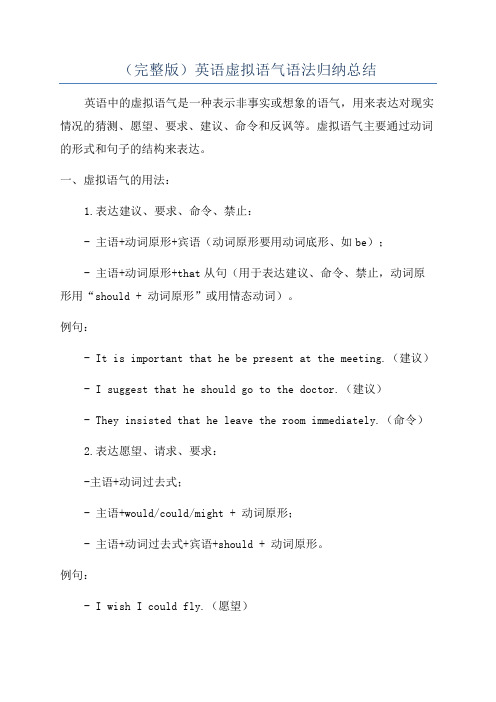
(完整版)英语虚拟语气语法归纳总结英语中的虚拟语气是一种表示非事实或想象的语气,用来表达对现实情况的猜测、愿望、要求、建议、命令和反讽等。
虚拟语气主要通过动词的形式和句子的结构来表达。
一、虚拟语气的用法:1.表达建议、要求、命令、禁止:- 主语+动词原形+宾语(动词原形要用动词底形、如be);- 主语+动词原形+that从句(用于表达建议、命令、禁止,动词原形用“should + 动词原形”或用情态动词)。
例句:- It is important that he be present at the meeting.(建议)- I suggest that he should go to the doctor.(建议)- They insisted that he leave the room immediately.(命令)2.表达愿望、请求、要求:-主语+动词过去式;- 主语+would/could/might + 动词原形;- 主语+动词过去式+宾语+should + 动词原形。
例句:- I wish I could fly.(愿望)- I would appreciate it if you could help me.(请求)3.表示虚拟条件:- If条件从句中的谓语动词用过去完成时,主句用would/should/might/could + have + 过去分词;- If条件从句中的谓语动词用过去时,主句用would/should/could + 动词原形。
例句:- If I had known his phone number, I would have called him.(虚拟条件)- If you had listened to me, we could have finished the project earlier.(虚拟条件)4.表达建议、要求、祝愿:- If only内部称述 + 主语 + 过去式。
虚拟语气总结

虚拟语气总结虚拟语气是指在表达某种假设、愿望、建议、要求、命令等语境下,表示与事实相反或不确定的情况。
它在语法上通常通过动词的形式、时态或其他语法手段来反映。
在本文中,我们将对虚拟语气进行总结和探讨。
一、虚拟语气形式1. 虚拟语气的主要形式有三种:过去时的虚拟、与过去事实相反的情况下的虚拟和对现在或将来的非事实情况的虚拟。
2. 过去时的虚拟:过去时的虚拟主要用于表示对现在或将来情况的否定假设。
常见的情况包括:与现在相反的假设、对未来的假设、对现在或过去的怀疑等。
例如:“如果我有足够的时间,我会去旅行。
”这里的“我有足够的时间”是一个假设情况。
3. 与过去事实相反的情况下的虚拟:与过去事实相反的情况下的虚拟主要用于表示不可能实现的愿望、建议、要求等。
例如:“要是我会弹吉他,我就能在演唱会上表演了。
”这里的“要是我会弹吉他”是与过去事实相反的假设情况。
4. 对现在或将来的非事实情况的虚拟:对现在或将来的非事实情况的虚拟主要用于表示对现实情况的否定、愿望或命令等。
例如:“如果我是你,我会好好珍惜机会。
”这里的“如果我是你”表示的是一个对现实情况的否定假设。
二、虚拟语气的用法1. 表示假设:虚拟语气常用于表达假设情况。
例如:“要是明天下雨,我们就不去野餐了。
”这里的“要是明天下雨”是条件状语从句,使用的是与现在或将来相反的虚拟语气。
2. 表示愿望:虚拟语气也经常用于表达愿望。
例如:“但愿我能赢得比赛。
”这里的“但愿我能赢得比赛”表示的是希望,但并不一定会实现。
3. 表示建议和要求:虚拟语气还可以用于表示建议和要求。
例如:“我建议你好好休息,不要工作太晚。
”这里的“我建议你好好休息”是对对方的建议。
4. 表示命令和禁止:虚拟语气也可用于表示命令和禁止。
例如:“要求学生们不要在教室里吃东西。
”这里的“不要在教室里吃东西”是对学生们的命令。
三、虚拟语气的注意事项1. 虚拟语气在使用时需遵循一定的语法规则,例如在条件状语从句中,谓语动词需使用过去式的形式。
高中英语之虚拟语气详细讲解
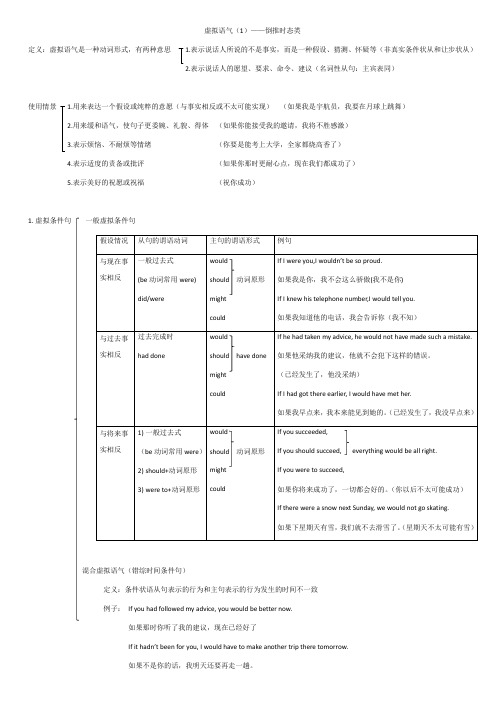
虚拟语气(1)——倒推时态类定义:虚拟语气是一种动词形式,有两种意思 1.表示说话人所说的不是事实,而是一种假设、猜测、怀疑等(非真实条件状从和让步状从)2.表示说话人的愿望、要求、命令、建议(名词性从句:主宾表同)使用情景 1.用来表达一个假设或纯粹的意愿(与事实相反或不太可能实现)(如果我是宇航员,我要在月球上跳舞)2.用来缓和语气,使句子更委婉、礼貌、得体(如果你能接受我的邀请,我将不胜感激)3.表示烦恼、不耐烦等情绪(你要是能考上大学,全家都烧高香了)4.表示适度的责备或批评(如果你那时更耐心点,现在我们都成功了)5.表示美好的祝愿或祝福(祝你成功)1.虚拟条件句一般虚拟条件句混合虚拟语气(错综时间条件句)定义:条件状语从句表示的行为和主句表示的行为发生的时间不一致例子:If you had followed my advice, you would be better now.如果那时你听了我的建议,现在已经好了If it hadn’t been for you, I would have to make another trip there tomorrow.如果不是你的话,我明天还要再走一趟。
If you had studied hard before,you would be a college student now.如果你以前努力学习的话,你现在就是大学生了。
省略+倒装当虚拟条件句的谓语动词中含有were,should,had时,if可以省略,并将were,should,had提前于句首,变为倒装句。
如果虚拟条件句是否定句,not 保留在原处If he should agree to go there, we should send him there.= Should he agree to go there,we should send him there.If she were there,she would agree with us.= Were she were, she would agree with us.If he had learnt about computers,we would have hired him.= Had he learnt about computers,we would have hired him.含蓄虚拟条件句定义:有时为了表达的需要,在虚拟语气中并不总是出现if引导的条件状语从句,而是通过其他手段来代替条件从句分类:1) but for....=(If it+be not for) ;without;Without your help ,we couldn’t have finished the work ahead of time.= But for your help,we couldn’t have finished the work ahead of time.= If it hadn’t been for your help,we couldn’t have finished the work ahead of time.没有你的帮助,我们不可能完成任务。
(完整版)虚拟语气倒装(讲解+练习)

虚拟语气有些条件句是可能实现的,称为真实条件句. 虚拟语气是动词的一种特殊形式,用来表达说话人的意愿.请求,设想,等未能或不可能实现的事实,或说话人看来实现可能性很小的情况.做这类题时首先要弄清楚虚拟语气的各种句型,即由if引导的虚拟条件句,省略if的倒装形式,可跟虚拟语气的宾语从句,同位语从句,表语从句的句型,以及表示祝愿或感叹的句子和由without, but for等介词引导的短语或句子.主要用法1). 主语从句,同位语从句中虚拟语气的用法.2). 宾语从句中虚拟语气的用法,尤其是wish 虚拟语气结构的用法.3). If条件句中虚拟语气的用法,应特别注意省略if的倒装结构是考试的重点.4). would rather(=wish)等结构中虚拟语气的用法.5). if only(如果。
就好了)结构中虚拟语气的用法.6). But, or, otherwise 等含蓄条件句的用法.7). It’s time (that)(早该。
)等结构中虚拟语气的用法.1. 虚拟语气在虚拟条件句中的运用(1) 虚拟语气现在时,用以表示与现在/将来事实相反的假设或现在实现可能性不大的情况.Eg. If I were a bird, I would fly to you.If it is not for their help, we shall be in a very difficult position.If it were not for their help, we should be in a very difficult position.If I had seen the film, I would…..(2) 虚拟语气过去式. 表示与过去事实完全相反的假设.Eg. If we had started earlier, we should not have missed the train.If she hadn’t been ill, she might have come.If she were not ill, she might come.◆书面语中,如果从句里含有should, had, were或其他助动词,则可将从属连词if省去,将助动词.情态动词.be或have放在句首形成部分倒装.Eg.Were he in your position,he’d do the same.If he Were in your position,he’d do the same.Had I had time, I would have done that yesterday.If I Had had time, I would have done that yesterday.If he Should (万一)come tomorrow, I should give him the dictionary.(3) 虚拟语气在某些从句中的应用.A)在(表现了说话人的愿望)wish, suggest, order, demand, propose,command, request, recommend, require, decide, insist, desire,urge等动词的宾语从句(should:应该) + 动词原形.以及would rather /sooner that后要用“ (should:应该) + 动词原形” 来表示愿望,建议,命令,要求等;由上述动词派生或转化的名词suggestion, proposal, plan,motion, recommendation, demand, order, desire, request,requirement, insistence, advice, decision , obligatory(义不容辞的,必须的同位语从句或表语从句中也要用相应的虚拟形式.Eg. His suggestion was that we (should) go at once.Wang insisted that we go at once.B)在It is/was + 某些形容词 + that (表现了说话人的愿望)从句的句型中,that从句中的谓语动词常用虚拟语气,即“should + 动词原形”这些形容词有:important, necessary, essential, imperative, natural, strange,advisable, desirable, possible, probable, astonishing,surprising, desired, suggested, requested, recommended,ordered, proposed, decided, moved等.C) “ should(居然/竟然) + 动词原形(或完成形式)” 可表示惊奇,遗憾,怀疑,不满等.ⅰ. 用于expect, believe, think, suspect 等动词的否定或疑问形式后的宾语从句中.Eg. I never expected that the new apartment should be so small.ⅱ. 用于“It is a pity, it is a shame, it is no wonder 等+ that”等结构后的主语从句中.Eg. It is a pity that he should be so careless.D) 在由for fear that, in case, lest 等引导的状语从句中,用“ should (万一)+ 动词原形” 表示“惟恐”的意思.Eg. He handled the instrument with care for fear that it should be damaged.E) 在“ It is (about/ high ) time + that (从句)(早就应该)” 中,谓语动词常用过去式表表示虚拟语气.Eg. It is high time that Chinese people learnt English.F) 在“as if/ as though”(似乎/好像) 引导的状语从句中,谓语动词与wish的宾语从句的虚拟形式相同.Eg. He w ork s with such enthusiasm as if he never knew fatigue. He speaks English as though he were an American.G) 在 look/sound/feel/ seem + as if / as though从句中,当表示真实情况时,用陈述语气; 否则,用虚拟语气.Eg.It seems as if they know each other. (真实情况)It seems as if they knew each other.It seems as though it were already spring. (虚拟语气)H) 用在if only(如果。
高中必备知识点解析虚拟语气的形式与用法

高中必备知识点解析虚拟语气的形式与用法虚拟语气是高中英语必备的语法知识点之一。
它在英语中经常被用于表达假设、愿望、建议、命令和推测等情态,通过使用虚拟语气,可以使语言更加丰富和准确。
本文将深入解析虚拟语气的形式与用法。
一、虚拟语气的形式1. 虚拟语气的一般现在时:用于表示与现在事实相反的情况。
其结构为:主语+动词原形(倒装)。
例如:If I were you, I would study harder.(如果我是你,我会更加努力学习。
)2. 虚拟语气的一般过去时:用于表示与过去事实相反的情况。
其结构为:主语+动词过去式(倒装)。
例如:If I had seen her yesterday, I would have said hello.(如果我昨天见到她,我会问好的。
)3. 虚拟语气的过去完成时:用于表示对过去情况的猜测或不可能发生的情况。
其结构为:主语+动词过去完成式(倒装)。
例如:I wish I had studied harder for the exam.(我希望我为考试努力学习。
)二、虚拟语气的用法1. 表达假设与条件:If I were you, I would travel around the world.(如果我是你,我会环游世界。
)I wish I had a million dollars.(我希望我有一百万美元。
)2. 表达愿望与建议:I wish you would stop smoking.(我希望你戒烟。
)It's important that she arrive on time.(她按时到达很重要。
)3. 表达命令与要求:The teacher ordered that the students be quiet.(老师要求学生们保持安静。
)She insisted that he leave immediately.(她坚持要他立刻离开。
)4. 表达推测与猜测:He looks as if he were sick.(他看起来像是生病了。
(完整版)高中英语语法虚拟语气讲解

高中英语语法讲解--虚拟语气1。
语气的定义和种类(1)语气的定义语气是动词的一种形式,它表示说话人对某一行为或事情的看法和态度。
(2)语气的种类A. 陈述语气表示动作或状态是现实的、确定的或符合事实的,用于陈述句、疑问句和某些感叹句。
We are not ready.Did it rain all day yesterday?What a fine day today!B. 祈使语气表使说话人的建议、请求、邀请、命令等。
Be careful.Don’t forget to clo se the window.Open the door, please。
C。
虚拟语气表使动作或状态不是客观存在的事实,而是说话人的主观愿望、假设或推测等.2。
虚拟语气一. 虚拟语气在条件句中的应用学习虚拟语气在条件句中的用法之前我们必须清楚条件句的种类:条件句有真实条件句与非真实条件句(或称虚拟条件句)两种。
真实条件句所表的假设是可能发生或实现的,句中的条件从句与结果主句都用陈述语气。
如:If it doesn’t rain tomorrow, I will go for a picnic。
假若明天不下雨,我就去野餐.Oil floats if you pour it on water. 你如把油倒在水里,油就浮起来。
虚拟条件句所表的假设则是不可能或不大可能发生或实现的,句中的条件从句与结果主句皆须用虚拟语), 主句的谓语用should (would, might, could)+动词原形。
如:If it were not raining, we should go for a picnic.如果现在不下雨的话,我们就出去野餐了。
(事实是:天在下雨,我们不能出去野餐.表示愿望。
)If he came here, he might be able to help you. 如果他来这,他就能够帮助你了。
(事实是:他没来这,他不可能帮助你。
高中虚拟语气用法解析
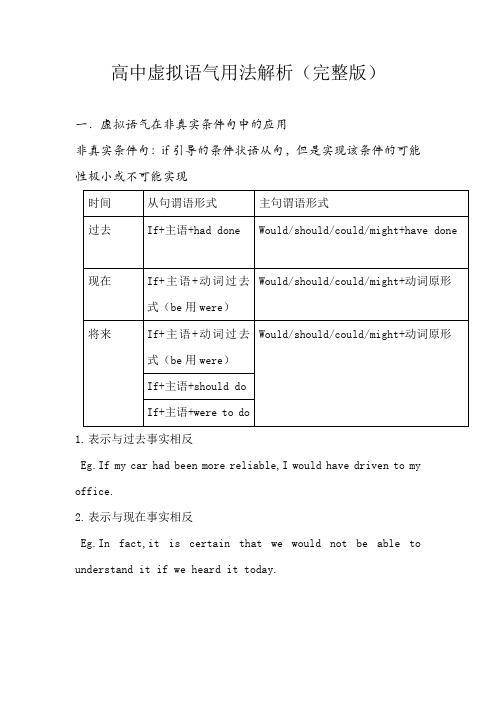
高中虚拟语气用法解析(完整版)一.虚拟语气在非真实条件句中的应用非真实条件句:if引导的条件状语从句,但是实现该条件的可能性极小或不可能实现1.表示与过去事实相反Eg.If my car had been more reliable,I would have driven to my office.2.表示与现在事实相反Eg.In fact,it is certain that we would not be able to understand it if we heard it today.3.表示与将来事实相反Eg.If you succeed,everything would be all right.Grace doesn't want to move to New York because she thinks if she were to live there,she wouldn't be able to see her parents.4.注意事项(1)W as不可以替代were,虚拟语气中,从句中be动词只有were(2)错综时间条件句:条件句的行为和主句行为发生的时间不一致,动词的形式按照主句和从句各自的时间调整。
Eg.If he had listened to me, he would not be in such trouble now. If it had not been raining too much, the crops would be growing much better.(3)虚拟条件句中的谓语动词含有were/ should /had 时,if可省略,而将were/ should /had 置于主语前面Eg.What would have happened had Bob walked farther as far as the river bank?Should he agree to go there, we should send him there. Were it Sunday tomorrow, we should go to the great wall.两个固定搭配:①Were it not for 要不是...就②Had it not been for 要不是...就If it were not for (Were it not for)the bad weather now, we would go to the park to fly kites.If it had not been for(Had it not been for) the bad weather yesterday, we would have gone to the park to fly kites. (4)含蓄虚拟条件句:有时假设的情况不是以if条件句来表示。
完整版)虚拟语气语法归纳
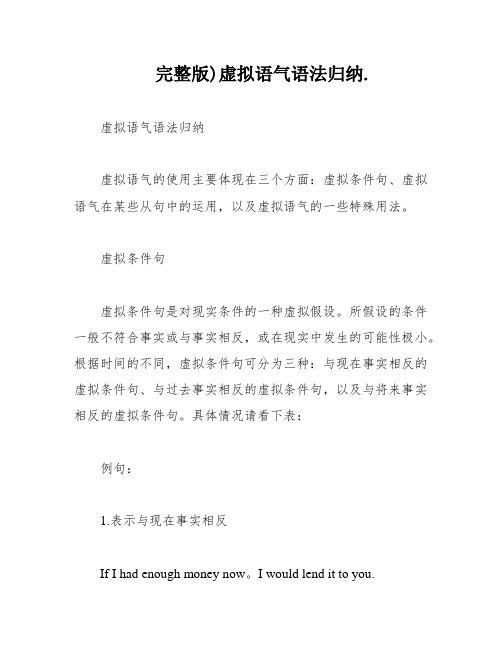
完整版)虚拟语气语法归纳.虚拟语气语法归纳虚拟语气的使用主要体现在三个方面:虚拟条件句、虚拟语气在某些从句中的运用,以及虚拟语气的一些特殊用法。
虚拟条件句虚拟条件句是对现实条件的一种虚拟假设。
所假设的条件一般不符合事实或与事实相反,或在现实中发生的可能性极小。
根据时间的不同,虚拟条件句可分为三种:与现在事实相反的虚拟条件句、与过去事实相反的虚拟条件句,以及与将来事实相反的虚拟条件句。
具体情况请看下表:例句:1.表示与现在事实相反If I had enough money now。
I would lend it to you.If I were you。
I would tell him my true feelings.If I were a boy。
I would join the army.If she had time。
she would go with you.2.表示与过去事实相反If he had XXX your advice。
XXX't have made such a bad mistake.She would have come to enjoy the party if she hadn't been very busy.If he had XXX my advice。
he would have XXX.3.表示与将来事实相反I would go shopping with you if it were Sunday tomorrow.If he were given another chance to do it again。
he could XXX.If it were to rain tomorrow。
the football match would be postponed.1.虚拟条件句的倒装在虚拟条件句中,为了强调所假设条件的虚拟性,或突出说话人的一种主观愿望,虚拟条件句可用倒装结构。
虚拟语气语法总结
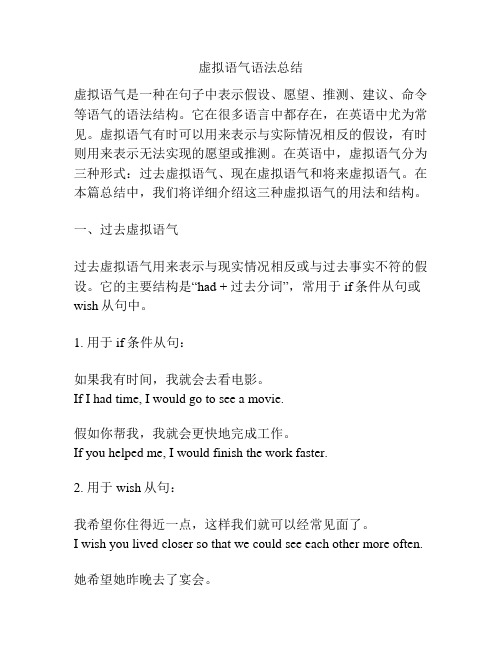
虚拟语气语法总结虚拟语气是一种在句子中表示假设、愿望、推测、建议、命令等语气的语法结构。
它在很多语言中都存在,在英语中尤为常见。
虚拟语气有时可以用来表示与实际情况相反的假设,有时则用来表示无法实现的愿望或推测。
在英语中,虚拟语气分为三种形式:过去虚拟语气、现在虚拟语气和将来虚拟语气。
在本篇总结中,我们将详细介绍这三种虚拟语气的用法和结构。
一、过去虚拟语气过去虚拟语气用来表示与现实情况相反或与过去事实不符的假设。
它的主要结构是“had + 过去分词”,常用于if条件从句或wish从句中。
1. 用于if条件从句:如果我有时间,我就会去看电影。
If I had time, I would go to see a movie.假如你帮我,我就会更快地完成工作。
If you helped me, I would finish the work faster.2. 用于wish从句:我希望你住得近一点,这样我们就可以经常见面了。
I wish you lived closer so that we could see each other more often. 她希望她昨晚去了宴会。
She wishes she had gone to the party last night.二、现在虚拟语气现在虚拟语气用来表示与现实情况相反或不太可能实现的愿望、建议、要求等。
它的主要结构是“should + 动词原形”或“were + to + 动词原形”。
1. 用于虚拟的愿望:如果我是你,我会马上辞职。
If I were you, I would quit my job immediately.(“were”表示与现实情况相反的假设)我希望你明白我的意思。
I wish you understood what I mean.(“understood”表示与现实情况不符的愿望)2. 用于虚拟的建议和要求:你应该尽早去看医生。
英语《虚拟语气》语法知识总结归纳
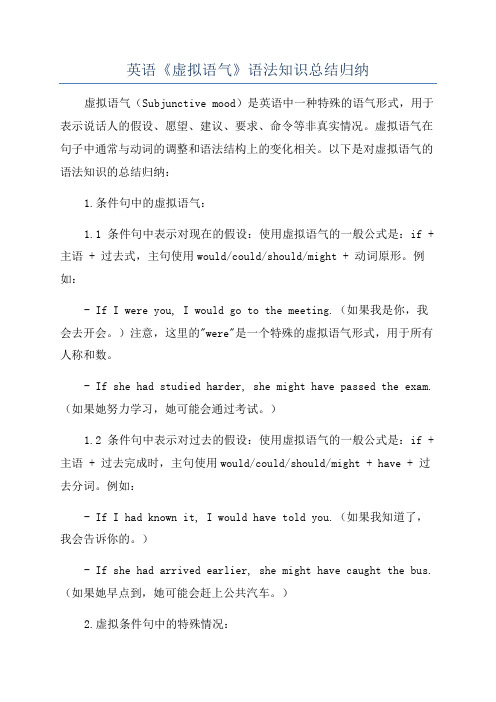
英语《虚拟语气》语法知识总结归纳虚拟语气(Subjunctive mood)是英语中一种特殊的语气形式,用于表示说话人的假设、愿望、建议、要求、命令等非真实情况。
虚拟语气在句子中通常与动词的调整和语法结构上的变化相关。
以下是对虚拟语气的语法知识的总结归纳:1.条件句中的虚拟语气:1.1 条件句中表示对现在的假设:使用虚拟语气的一般公式是:if + 主语 + 过去式,主句使用would/could/should/might + 动词原形。
例如:- If I were you, I would go to the meeting.(如果我是你,我会去开会。
)注意,这里的"were"是一个特殊的虚拟语气形式,用于所有人称和数。
- If she had studied harder, she might have passed the exam.(如果她努力学习,她可能会通过考试。
)1.2 条件句中表示对过去的假设:使用虚拟语气的一般公式是:if + 主语 + 过去完成时,主句使用would/could/should/might + have + 过去分词。
例如:- If I had known it, I would have told you.(如果我知道了,我会告诉你的。
)- If she had arrived earlier, she might have caught the bus.(如果她早点到,她可能会赶上公共汽车。
)2.虚拟条件句中的特殊情况:2.1 在虚拟条件句中表示命令、建议时,主句中的动词可以使用动词原形(而不是would/could/should/might + 动词原形)。
例如:- If you have any questions, please let me know.(如果你有任何问题,请告诉我。
)- If I were you, I would take a break.(如果我是你,我会休息一下。
(完整版)虚拟语气详解
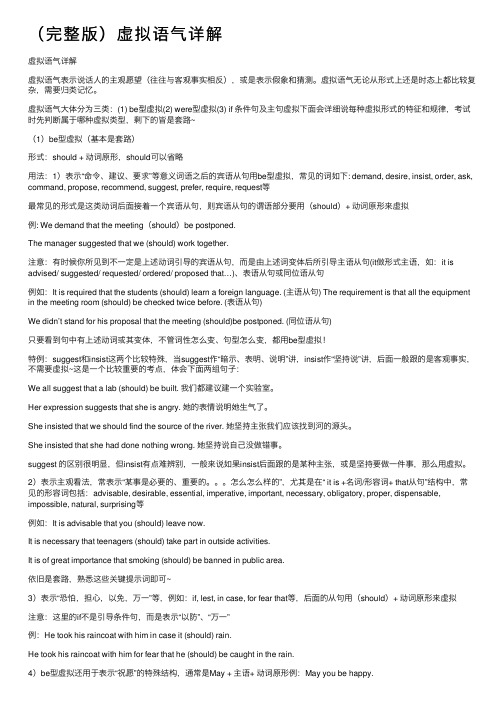
(完整版)虚拟语⽓详解虚拟语⽓详解虚拟语⽓表⽰说话⼈的主观愿望(往往与客观事实相反),或是表⽰假象和猜测。
虚拟语⽓⽆论从形式上还是时态上都⽐较复杂,需要归类记忆。
虚拟语⽓⼤体分为三类:(1) be型虚拟(2) were型虚拟(3) if 条件句及主句虚拟下⾯会详细说每种虚拟形式的特征和规律,考试时先判断属于哪种虚拟类型,剩下的皆是套路~(1)be型虚拟(基本是套路)形式:should + 动词原形,should可以省略⽤法:1)表⽰“命令、建议、要求”等意义词语之后的宾语从句⽤be型虚拟,常见的词如下: demand, desire, insist, order, ask, command, propose, recommend, suggest, prefer, require, request等最常见的形式是这类动词后⾯接着⼀个宾语从句,则宾语从句的谓语部分要⽤(should)+ 动词原形来虚拟例: We demand that the meeting(should)be postponed.The manager suggested that we (should) work together.注意:有时候你所见到不⼀定是上述动词引导的宾语从句,⽽是由上述词变体后所引导主语从句(it做形式主语,如:it is advised/ suggested/ requested/ ordered/ proposed that…)、表语从句或同位语从句例如:It is required that the students (should) learn a foreign language. (主语从句) The requirement is that all the equipment in the meeting room (should) be checked twice before. (表语从句)We didn’t stand for his proposal that the meeting (should)be postponed. (同位语从句)只要看到句中有上述动词或其变体,不管词性怎么变、句型怎么变,都⽤be型虚拟!特例:suggest和insist这两个⽐较特殊,当suggest作“暗⽰、表明、说明”讲,insist作“坚持说”讲,后⾯⼀般跟的是客观事实,不需要虚拟~这是⼀个⽐较重要的考点,体会下⾯两组句⼦:We all suggest that a lab (should) be built. 我们都建议建⼀个实验室。
(完整版)虚拟语气讲解
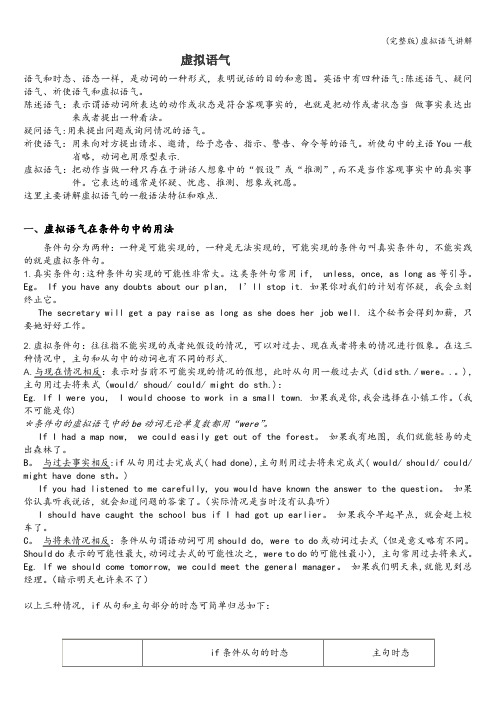
虚拟语气语气和时态、语态一样,是动词的一种形式,表明说话的目的和意图。
英语中有四种语气:陈述语气、疑问语气、祈使语气和虚拟语气。
陈述语气:表示谓语动词所表达的动作或状态是符合客观事实的,也就是把动作或者状态当做事实表达出来或者提出一种看法。
疑问语气:用来提出问题或询问情况的语气。
祈使语气:用来向对方提出请求、邀请,给予忠告、指示、警告、命令等的语气。
祈使句中的主语You一般省略,动词也用原型表示.虚拟语气:把动作当做一种只存在于讲话人想象中的“假设”或“推测”,而不是当作客观事实中的真实事件。
它表达的通常是怀疑、忧虑、推测、想象或祝愿。
这里主要讲解虚拟语气的一般语法特征和难点.一、虚拟语气在条件句中的用法条件句分为两种:一种是可能实现的,一种是无法实现的,可能实现的条件句叫真实条件句,不能实践的就是虚拟条件句。
1. 真实条件句:这种条件句实现的可能性非常大。
这类条件句常用if, unless, once, as long as等引导。
Eg。
If you have any doubts about our plan, I’ll stop it. 如果你对我们的计划有怀疑,我会立刻终止它。
The secretary will get a pay raise as long as she does her job well. 这个秘书会得到加薪,只要她好好工作。
2. 虚拟条件句:往往指不能实现的或者纯假设的情况,可以对过去、现在或者将来的情况进行假象。
在这三种情况中,主句和从句中的动词也有不同的形式.A. 与现在情况相反:表示对当前不可能实现的情况的假想,此时从句用一般过去式(did sth./ were。
.。
),主句用过去将来式(would/ shoud/ could/ might do sth.):Eg. If I were you, I would choose to work in a small town. 如果我是你,我会选择在小镇工作。
(完整版)英语虚拟语气语法归纳总结
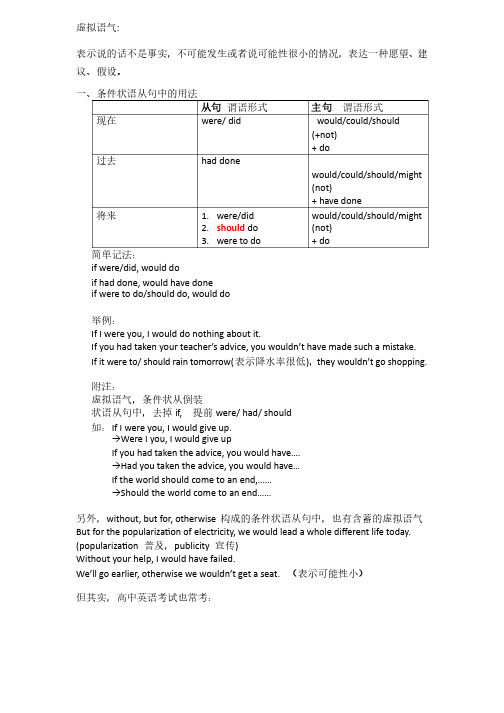
虚拟语气:表示说的话不是事实,表示说的话不是事实,不可能发生或者说可能性很小的情况,不可能发生或者说可能性很小的情况,不可能发生或者说可能性很小的情况,表达一种愿望、表达一种愿望、表达一种愿望、建建议、假设。
议、假设。
一、条件状语从句中的用法一、条件状语从句中的用法从句 谓语形式谓语形式主句 谓语形式谓语形式现在现在were/ didwould/could/should (+not) + do 过去过去 had donewould/could/should/might (not)+ have done将来将来1. were/did2. should do3. were to dowould/could/should/might (not) + do简单记法:简单记法:if were/did, would doif had done, would have done if were to do/should do, would do举例:举例:If I were you, I would do nothing about it.If you had taken your teacher’s advice, you wouldn’t have made such a mistake. If it were to/ should rain tomorrow(表示降水率很低),they wouldn’t go shopping.附注:附注:虚拟语气,条件状从倒装虚拟语气,条件状从倒装状语从句中,去掉if, 提前were/ had/ should 如:If I were you, I would give up. →Were I you, I would give upIf you had taken the advice, you would have…. →Had you taken the advice, you would have… If the world should come to an end,…… →Should the world come to an end……另外,without, but for, otherwise 构成的条件状语从句中,也有含蓄的虚拟语气构成的条件状语从句中,也有含蓄的虚拟语气 But for the populariza on of electricity, we would lead a whole different life today. (populariza on 普及,publicity 宣传) Without your help, I would have failed.We’ll go earlier, otherwise we wouldn’t get a seat. (表示可能性小)(表示可能性小)但其实,高中英语考试也常考:但其实,高中英语考试也常考:错综虚拟语气条件句错综虚拟语气条件句 即:即:假设条件状从发生的时间与所假设的谓语动词不一致,此时,主句和从句要根据各自的时间而定。
(完整版)高中虚拟语气用法详解
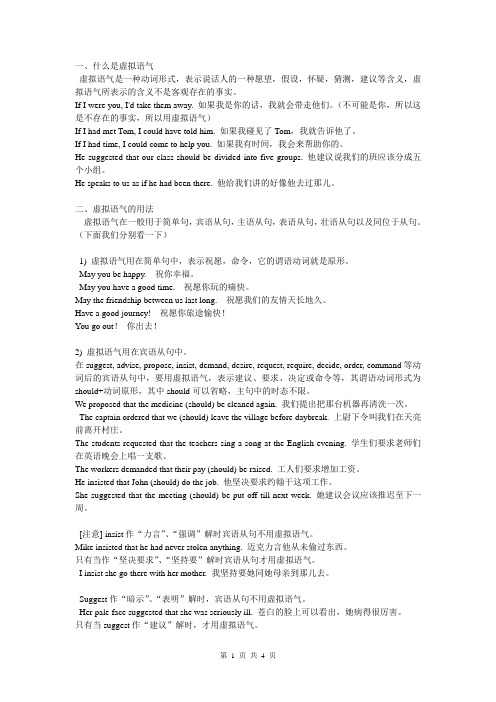
一、什么是虚拟语气虚拟语气是一种动词形式,表示说话人的一种愿望,假设,怀疑,猜测,建议等含义,虚拟语气所表示的含义不是客观存在的事实。
If I were you, I'd take them away. 如果我是你的话,我就会带走他们。
(不可能是你,所以这是不存在的事实,所以用虚拟语气)If I had met Tom, I could have told him. 如果我碰见了Tom,我就告诉他了。
If I had time, I could come to help you. 如果我有时间,我会来帮助你的。
He suggested that our class should be divided into five groups. 他建议说我们的班应该分成五个小组。
He speaks to us as if he had been there. 他给我们讲的好像他去过那儿。
二、虚拟语气的用法虚拟语气在一般用于简单句,宾语从句,主语从句,表语从句,壮语从句以及同位于从句。
(下面我们分别看一下)1) 虚拟语气用在简单句中,表示祝愿,命令,它的谓语动词就是原形。
May you be happy. 祝你幸福。
May you have a good time. 祝愿你玩的痛快。
May the friendship between us last long. 祝愿我们的友情天长地久。
Have a good journey! 祝愿你旅途愉快!You go out!你出去!2) 虚拟语气用在宾语从句中。
在suggest, advise, propose, insist, demand, desire, request, require, decide, order, command等动词后的宾语从句中,要用虚拟语气,表示建议、要求、决定或命令等,其谓语动词形式为should+动词原形,其中should可以省略,主句中的时态不限。
虚拟语气讲解(整理)

(3)虚拟语气在 在主语从句中
A.在句型 “It is important (necessary, strange, natural) that .... ” 中,that 后面的从句中的谓语动词 用: should + 动词原形
1. 我们有必要出去散散步。 It’s necessary that we should have a walk now.
2.用于表示命令、建议、要求等一类词后面的宾语从句。 insist, order, command, suggest, advise, propose, require, request, demand, desire etc.
We suggested that the meeting (should) be put off.
7. It is of the utmost importance that you ______ here on time. a. be b. shall be c. are to be d. must be
三、虚拟语气在其他从句中
1. It is (high / about ) time that…从句中的谓 语动词用过去式或should+动词原形,should 不能省略. It is high time that you went / should go to school.
I would rather you told me the truth. I would rather you had gone there last Sunday.
4. as if ( as though) 看起来 常用虚拟形式,即 表示与现在事实相反,用过去式;与过去事实相反 用过去完成式 (had done).
虚拟语气用法归纳完整版

虚拟语气用法归纳英语的动词一般可带有三种不同的语气:陈述语气,祈使语气和虚拟语气。
不同的语气用动词的不同形式(有的还借助句法形式)来表示。
一、虚拟条件句条件句有两类:一类是真实条件句,一类是虚拟条件句如果假设的情况是有可能发生的,就是真实条件句,谓语用陈述语气。
If you don 'work hard, you will fail.If it is fine tomorrow, we will go for a picnic.如果假设的情况过去、现在、将来都不存在,则为虚拟语气虚拟条件句和对应主句的动词形式列表:1•与现在事实相反的虚拟What would you do if you won the lottery?If I were you, I would seize the cha nee to go abroad.If I had a lot of money no w, I would travel around the world.2. 与过去事实相反的虚拟If you had bee n here yesterday, you would have see n her.If he had driven more carefully, he would not have had the car accident yesterday.3. 与将来事实相反的虚拟If it were to rain/should rai n/rai ned tomorrow, our pla n would be put off.If we were to pic nic, we would not be able to help.二、错综、混合虚拟语气通常,在上面表格里反映的是非真实条件句的虚拟语气模式,从句和主句的谓语动词时间是一致的,如果两者时间不一致,此时就是混合型虚拟语气。
混合型虚拟语气的使用要求“各自为政”,即从句和主句根据各自假设的时间不同,采用上面表格中对应的的谓语动词形式。
(完整版)虚拟语气用法归纳

虚拟语气(the subjunctive mood)用法归纳第一部分:语气的定义和种类1、语气(mood)语气是动词的一种形式,表示说话人对某一行为或事情的看法和态度。
2、语气的种类⑴陈述语气:表示动作或状态是现实的、确定的或符合事实的,用于陈述句、疑问句和某些感叹句。
如:①There are two sides to every question. 每个问题都有两个方面。
②Were you busy all day yesterday? 昨天一整天你都很忙吗?③How good a teacher she is! 她是多好的一位老师啊!⑵祈使语气:表示说话人对对方的请求或命令。
如:①Never be late again! 再也不要迟到了。
②Don’t forget to turn off the light. 别忘了关灯。
⑶虚拟语气:表示动作或状态不是客观存在的事实,而是说话人的主观愿望、假设或推测等。
如:①If I were a bird, I could fly in the air. 如果我是一只小鸟,我就能在空中飞行。
②I wish I could pass the examination. 我希望我能通过考试。
③May you succeed! 祝您成功!第二部分:简单句中的虚拟语气一、情态动词的过去式用于现在时态时,表示说话人的谦虚、客气、有礼貌、或委婉的语气,常用于日常会话中。
如:⑴Would you be kind enough to show me the way to the post office?请你告诉我去邮局的路好吗?⑵It would be better for you not to stay up too late. 你最好别熬夜到很晚。
二、表祝愿。
1、常用“may+动词原形”表示祝愿,但愿,may须置于句首(多用于正式文体中)。
如:⑴May good luck be yours! 祝你好运!⑵May you be happy! 祝你快乐!⑶May you do even better! 祝你取得更大成就!⑷May you have a good time. 祝愿你玩的痛快。
(完整版)虚拟语气常见句型

一、wish从句中的虚拟语气wish +从句表示一种愿望或希望.是要。
.。
就好了!1. 从句动词用“过去式" ,表示从句动作与wish同时存在或发生。
例如:I wish I knew as much as you do。
要是我知道的和你一样多就好了。
I wish I were a PLA man .我希望我是一名中国人民解放军。
2. 从句动词用“had+过去分词,表示从句动作在wish之前存在或发生。
例如:I wish I had been at the club yesterday. 要是我昨天在俱乐部就好了.3. 从句动词用“would/could+动词原形”,表示从句动作在wish之后存在或发生。
例如:I wish it would stop raining tomorrow. 我希望明天雨能停。
二、as if 从句中的虚拟语气“as if/as though +从句”,表示方式。
从句中动词的用法与wish从句中的动词类似.例如:1. She looks as if she were ten years younger. 她看起来好像年轻了十岁。
(从句动作与主句同时存在或发生)2. The village looks as though it had been deserted for years。
这个村子看起来好像很多年没人住了。
(从句动作在主句之前存在或发生)3. They talked and talked as if they would never meet again。
他们意犹未尽地谈着,好像将来再也不见面一样。
(从句动作在主句之后存在或发生)He looks as if he were ill .他看起来好象是生病了。
(2)Tom looks as if nothing had happened to him .汤姆看起来啥事都没有发生似的。
注意:从句表示的内容若为事实或可能为事实,也可用陈述语气。
英语的虚拟语气知识点讲解

英语的虚拟语气知识点讲解一、虚拟语气的概念。
虚拟语气是一种特殊的动词形式,表示所说的话不是事实,而是一种假设、愿望、怀疑、推测或与事实相反的情况等。
二、虚拟语气在非真实条件句中的用法。
1. 与现在事实相反。
- 条件从句的谓语动词用一般过去式(be动词一般用were),主句的谓语动词用“should/would/could/might + 动词原形”。
- 例如:If I were you, I would take an umbrella.(实际上我不是你)2. 与过去事实相反。
- 条件从句的谓语动词用“had + 过去分词”,主句的谓语动词用“should/would/could/might+have +过去分词”。
- 例如:If he had taken my advice, he would have passed the exam.(实际上他没听我的建议,也没通过考试)3. 与将来事实相反。
- 条件从句的谓语动词有三种形式:一般过去式、“should+动词原形”、“were to+动词原形”,主句的谓语动词用“should/would/could/might +动词原形”。
- 例如:If it rained/were to rain/should rain tomorrow, we would not go out.三、虚拟语气在宾语从句中的用法。
1. wish后的宾语从句。
- 表示与现在事实相反的愿望,从句谓语动词用一般过去式(be动词用were)。
例如:I wish I were a bird.(实际上我不是鸟)- 表示与过去事实相反的愿望,从句谓语动词用“had+过去分词”。
例如:Iwish I had seen the film yesterday.(实际上昨天没看这部电影)- 表示与将来事实相反的愿望,从句谓语动词用“would/could/might+动词原形”。
例如:I wish I could fly to the moon tomorrow.2. 在表示建议、要求、命令等意义的动词后的宾语从句中(如suggest, advise, demand, require, order等)- 从句谓语动词用“should+动词原形”,should可以省略。
- 1、下载文档前请自行甄别文档内容的完整性,平台不提供额外的编辑、内容补充、找答案等附加服务。
- 2、"仅部分预览"的文档,不可在线预览部分如存在完整性等问题,可反馈申请退款(可完整预览的文档不适用该条件!)。
- 3、如文档侵犯您的权益,请联系客服反馈,我们会尽快为您处理(人工客服工作时间:9:00-18:30)。
虚拟语气详解虚拟语气表示说话人的主观愿望(往往与客观事实相反),或是表示假象和猜测。
虚拟语气无论从形式上还是时态上都比较复杂,需要归类记忆。
虚拟语气大体分为三类:(1) be型虚拟(2) were型虚拟(3) if 条件句及主句虚拟下面会详细说每种虚拟形式的特征和规律,考试时先判断属于哪种虚拟类型,剩下的皆是套路~(1)be型虚拟(基本是套路)形式:should + 动词原形,should可以省略用法:1)表示“命令、建议、要求”等意义词语之后的宾语从句用be型虚拟,常见的词如下: demand, desire, insist, order, ask, command, propose, recommend, suggest, prefer, require, request等最常见的形式是这类动词后面接着一个宾语从句,则宾语从句的谓语部分要用(should)+ 动词原形来虚拟例: We demand that the meeting(should)be postponed.The manager suggested that we (should) work together.注意:有时候你所见到不一定是上述动词引导的宾语从句,而是由上述词变体后所引导主语从句(it做形式主语,如:it is advised/ suggested/ requested/ ordered/ proposed that…)、表语从句或同位语从句例如:It is required that the students (should) learn a foreign language. (主语从句) The requirement is that all the equipment in the meeting room (should) be checked twice before. (表语从句)We didn’t stand for his proposal that the meeting (should)be postponed. (同位语从句)只要看到句中有上述动词或其变体,不管词性怎么变、句型怎么变,都用be型虚拟!特例:suggest和insist这两个比较特殊,当suggest作“暗示、表明、说明”讲,insist作“坚持说”讲,后面一般跟的是客观事实,不需要虚拟~这是一个比较重要的考点,体会下面两组句子:We all suggest that a lab (should) be built. 我们都建议建一个实验室。
Her expression suggests that she is angry. 她的表情说明她生气了。
She insisted that we should find the source of the river. 她坚持主张我们应该找到河的源头。
She insisted that she had done nothing wrong. 她坚持说自己没做错事。
suggest 的区别很明显,但insist有点难辨别,一般来说如果insist后面跟的是某种主张,或是坚持要做一件事,那么用虚拟。
2)表示主观看法,常表示“某事是必要的、重要的。
怎么怎么样的”,尤其是在“ it is +名词/形容词+ that从句”结构中,常见的形容词包括:advisable, desirable, essential, imperative, important, necessary, obligatory, proper, dispensable, impossible, natural, surprising等例如:It is advisable that you (should) leave now.It is necessary that teenagers (should) take part in outside activities.It is of great importance that smoking (should) be banned in public area.依旧是套路,熟悉这些关键提示词即可~3)表示“恐怕,担心,以免,万一”等,例如:if, lest, in case, for fear that等,后面的从句用(should)+ 动词原形来虚拟注意:这里的if不是引导条件句,而是表示“以防”、“万一”例:He took his raincoat with him in case it (should) rain.He took his raincoat with him for fear that he (should) be caught in the rain.4)be型虚拟还用于表示“祝愿”的特殊结构,通常是May + 主语+ 动词原形例:May you be happy.几乎不考,了解即可~(2)were型虚拟(要推时态)表达与事实情况相反、未曾实现的主观愿望,形式如下:用法:1)wish引导的宾语从句,表示“希望”例:I wish I were a bird. (对现在情况的虚拟)I wish you came here now. (我希望你现在就来)I wish that I had passed the final exam. (对过去情况虚拟,实际上未通过考试)I wish he would/ could come to help me with my paper, but he will go on business next week. (对将来情况虚拟,实际上下周来不了)注意句子里的时间标志,有时没有时间标志,就需要自行体会~2)if only引导的感叹句,表示“要是…就好了”例:If only she were here at this moment. 要是她此刻在这儿就好了。
If only I hadn’t made this mistake. 要是我没犯这个错误就好了。
If only you would / could attend my wedding. 要是你能来参加我的婚礼就好了。
(现在也会用过去式表示将来,但是表示将来的不怎么会考,所以无需纠结)3)would rather, would sooner, would prefer, had rather等引导的宾语从句,表示“宁愿,但愿”例:I would rather you came here now.l would rather he hadn’t told me the truth.I’d rather you went tomorrow. (同样也会用过去式表示将来)4)as if / as though 引导的状语从句,表示“似乎…,好像...”,与事实情况相反或几乎不大可能会发生例:She speaks as though she were sick.He talked about the film as if he had seen it before.It seems as if the meeting would never end.注意:如果as if / as though 后面跟的是事实或者近乎事实,则不需要虚拟,只能意会不能言传,对比一下下面两句话就知道了,但这并不是高频考点It seems as if he has no worries. 看起来他似乎没有烦恼,是真的没有烦恼。
It seems as if he had no worries. 他只是看起来没烦恼,其实内心世界很纠结。
(3)if条件句及主句虚拟if引导的条件句分为真实条件句和非真实条件句,非真实条件句的主句和从句都要用虚拟语气,表示根本不存在的情况或可能性很小的假设。
主句和从句都有一定套路,而且要根据时态搭配使用,具体见下表:例:If I had enough money, I would buy myself a computer.If we had had enough rain last year, we could have gained a good harvest.If I should see/ were to see/ saw him tomorrow, I would invite him home. would, could, might, should在意思上稍有区别,would语气肯定,表示十有八九会出现的结果;could 表示能够;might表示或许;should表示应该,但这个区别真的不重要…考试也不会在这个上面做文章,自己稍稍理解体会,留个印象就行。
注意1:表格中的是最基本的规则,主句和从句发生在同一个时空(假如我当初怎样,那么我当时就会怎样,都是发生在过去时间;假如我现在怎样,我现在就会怎么怎么,都是发生在当下)。
但也会有些情况,主从句动作发生的时间不一致(假如我以前怎么样,我现在就会怎样;假如我现在怎样,我将来就会怎样。
)我们把这种类型的句子称作“错综时间”虚拟条件句,看上去很厉害的样子,其实只需要把主从句分开独立分析,看主、从句分别是对什么时间的虚拟,各自对应表格就行。
关键是先判断主、从句发生时间是否一致,考试很喜欢考~例:If you had worked hard, you would be very tired. 如果你刚才认真工作了,你现在就会很累。
主句对现在虚拟,从句对过去虚拟。
If you followed my advice now, you would succeed in the final exam next month.要是你现在听我的话,下个月的期末考肯定没问题。
主句对将来虚拟,从句对现在虚拟。
注意2:虚实混用,有的部分是真实的,有的部分是虚拟的,非真实的部分才虚拟,真实的部分用正常语法形式例:If I had been at the concert yesterday evening, I should have met the famous singer. But I failed to get a ticket. 前面是对过去的虚拟,是没发生的,但是没买到是真实发生的,所以正常用过去式即可。
注意3:倒装结构:if从句中如果含有were,should,had时可以省略if,将were,should,had倒装至主语之前。
例:If I were you, I would apply for the job. ——> Were I you, I would apply for the job.If you had taken my advice, you wouldn’t have failed in the examination. ——> Had you taken my advice, you wouldn’t have failed in the examination.If he should arrive there in advance, I would show him around London. ——> Should he arrive there in advance, I would show him around London.注意4:有时假设的情况并不用if从句表示出来,而是通过一个介词/介词短语(without, but for等)、副词(otherwise)、连词(or, but, but that等)、were it not for、had it not been for, 这属于含蓄的虚拟语气。
